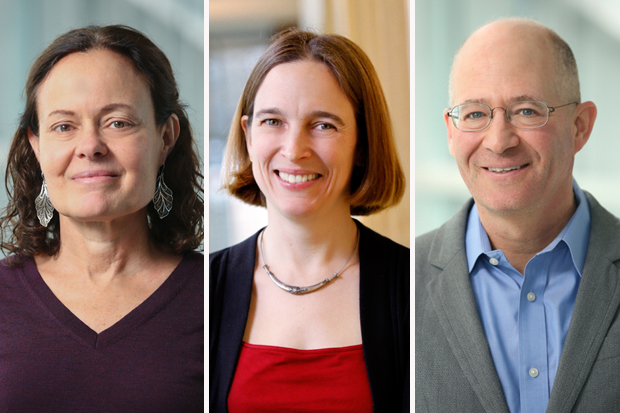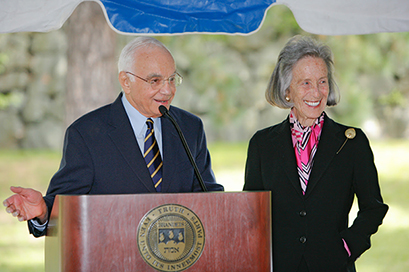Three named to newly-created Barbara Mandel Professorships
The new named chairs honor the legacy of the late trustee, recognizing excellence in scholarship and teaching
 Photo/Mike Lovett
Photo/Mike LovettThe newly-named Barbara Mandel Professors of Humanities and Humanistic Social Sciences: Sarah Lamb, Wendy Cadge, and John Plotz.
Brandeis University has announced the appointment of three distinguished scholars to the newly-established Barbara Mandel Professorships of Humanities and Humanistic Social Sciences.
Named to the chairs were Wendy Cadge, a professor of sociology and women’s gender and sexuality studies whose focus is the sociology of religion; Sarah Lamb, a professor of anthropology whose work centers on aging and gender; and John Plotz, a professor of English who specializes in Victorian literature and the novel.
The professorships honor the legacy of the late Barbara Mandel, P’73, H’19, a vice-chair of the Brandeis Board of Trustees who was a champion of the humanities at the university as well as one of Brandeis’ greatest benefactors. Mrs. Mandel passed away in November 2019 at age 93.
“Barbara’s devotion to the humanities is quite evident at Brandeis,” said President Ron Liebowitz. The Mandel Center for the Humanities that was established on campus in 2010 by a gift from her family foundation, he said, has “deepened the university’s humanities scholarship while strengthening students’ knowledge and critical thinking across many disciplines.” The center’s atrium and lecture hall are dedicated in Mrs. Mandel’s honor.
Now her name will live on in a trio of humanities chairs. “I know Barbara would have been proud of the inaugural holders of these professorships that bear her name,” said Liebowitz, who looks forward to hosting a future event at which the chairs will be presented formally and in-person.
Liebowitz said each appointment recognizes “exemplary accomplishment” as a scholar in the humanities and humanistic social sciences, as well as a “commitment to teaching and mentorship that has inspired countless Brandeis students and served as a model for our colleagues across the university.”
Wendy Cadge is an expert in contemporary American religion. She is the founder of the Chaplaincy Innovation Lab, which brings chaplains, social scientists, and theological and clinical educators into a research-based conversation on chaplaincy and spiritual care.
Cadge is author of “Paging God: Religion in the Halls of Medicine” and “Heartwood: The First Generation of Theravada Buddhism in America,” and a co-editor of “Religion on the Edge: De-Centering and Re-Centering the Sociology of Religion.” She is head of the social science division and senior associate dean for strategic initiatives in the School of Arts and Sciences as well as a former chair of women’s, gender, and sexuality studies.
Sarah Lamb, current chair of women’s, gender, and sexuality studies at the university, became the first Brandeis faculty member to receive a so-called “Brainy Award” when she was named an Andrew Carnegie Fellow 2019 for her research into perspectives on “successful aging.”
In her writing and teaching as a cultural anthropologist, Lamb draws on years of fieldwork in India and the United States. She is writing a book, “Being Single in India: Stories of Gender, Exclusion, and Belonging,” that explores the lives of single women in India.
John Plotz describes himself as a “novel person” who has worked his way from George Eliot, Thomas Hardy and Willa Cather to 21st-century science fiction and fantasy. He is a former Guggenheim Fellow.
His books include "The Crowd: British Literature and Public Politics," "Portable Property: Victorian Culture on the Move," and "Semi-Detached: The Aesthetics of Virtual Experience since Dickens," as well as a children's book, "Time and the Tapestry: A William Morris Adventure." He co-hosts with Brandeis anthropologist Elizabeth Ferry a podcast, Recall this Book.
At her passing, Mrs. Mandel was recalled as one of Brandeis’ most dedicated servants as well as one of its greatest benefactors.

Morton Mandel and Barbara Mandel at the opening of the Mandel Center for the Humanities in October 2010.
Through their family foundation, Mrs. Mandel and her late husband, the philanthropist Morton Mandel, P’73, H’89, were among Brandeis’ most generous supporters. With the Jack, Joseph and Morton Mandel Foundation that her husband founded with his brothers, the Mandels had given some $56 million to Brandeis over the years. Morton Mandel died at 98 in October, a few weeks before his wife.
The foundation's largest gift to Brandeis, $22.5 million, created the Mandel Center for the Humanities. The gift was among the largest ever made to an American university for the express purpose of transforming the study and understanding of the humanities’ role in everyday life.
Other gifts have established the Jack, Joseph, and Morton Mandel Center for Studies in Jewish Education, endowed faculty chairs, and supported graduate fellowships.
Mrs. Mandel was elected to the Brandeis’ Board of Trustees in 2005. Brandeis awarded her an honorary Doctor of Humane Letters degree in 2019. Her daughter, Amy ’73, is an alumna.
Jehuda Reinharz, PhD’72, H’11, president emeritus of Brandeis and president of the Mandel Foundation, recalled Mrs. Mandel’s drive.
“When I asked Barbara Mandel to join the board of trustees of Brandeis University, she made it very clear that she wanted to play an active role on the board,” Reinharz said. “That was a typical Barbara response: whatever organization she joined, whether the National Council of Jewish Women, the Cooper Hewitt Museum, the Hebrew University and, of course, Brandeis, she rose to positions of leadership and authority.”
“Barbara did not have the need to speak at board meetings, but when she did, people listened. She read every word of the voluminous materials that were sent in advance. Barbara got things done and never shied from the hard work on the boards on which she served.”
"Most of all, I will always remember Barbara as my friend," Reinharz said. "She supported and championed us at every turn. And as we all know, she and Mort were among Brandeis' greatest benefactors. Both of them cared deeply about Brandeis and always wanted to know how it was faring and how they could help. The university and all of us who knew them will forever be in their debt."
Categories: Alumni, Humanities and Social Sciences





